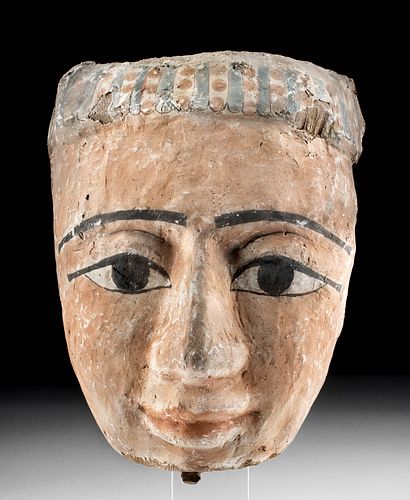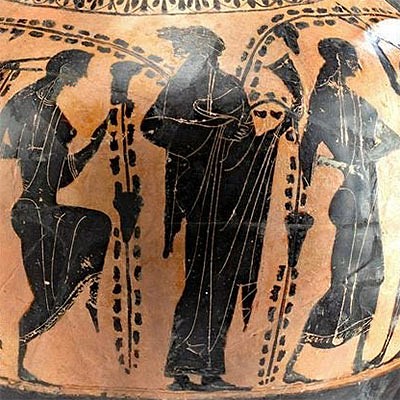Egyptian Polychrome & Gesso Wood Mummy Mask
Lot 11
About Seller
Artemis Fine Arts
686 S Taylor Ave, Ste 106
Louisville, CO 80027
United States
Selling antiquities, ancient and ethnographic art online since 1993, Artemis Gallery specializes in Classical Antiquities (Egyptian, Greek, Roman, Near Eastern), Asian, Pre-Columbian, African / Tribal / Oceanographic art. Our extensive inventory includes pottery, stone, metal, wood, glass and textil...Read more
Estimate:
$7,500 - $11,250
Absentee vs Live bid
Two ways to bid:
- Leave a max absentee bid and the platform will bid on your behalf up to your maximum bid during the live auction.
- Bid live during the auction and your bids will be submitted real-time to the auctioneer.
Bid Increments
| Price | Bid Increment |
|---|---|
| $0 | $25 |
| $300 | $50 |
| $1,000 | $100 |
| $2,000 | $250 |
| $5,000 | $500 |
| $10,000 | $1,000 |
| $20,000 | $2,500 |
| $50,000 | $5,000 |
| $100,000 | $10,000 |
| $200,000 | $20,000 |
About Auction
By Artemis Fine Arts
Jun 10, 2021
Set Reminder
2021-06-10 10:00:00
2021-06-10 10:00:00
America/New_York
Bidsquare
Bidsquare : Exceptional Antiquities | Asian | Ethnographic
https://www.bidsquare.com/auctions/artemis-gallery/exceptional-antiquities-asian-ethnographic-7012
Museum-worthy examples of Egyptian, Greek, Roman, Viking, Near Eastern, Far East / Asian, Pre-Columbian, African / Tribal, Oceanic, Native American, Spanish Colonial, Russian, Fossils, Ancient Jewelry, Fine Art, so much more! Artemis Fine Arts info@artemisgallery.com
Museum-worthy examples of Egyptian, Greek, Roman, Viking, Near Eastern, Far East / Asian, Pre-Columbian, African / Tribal, Oceanic, Native American, Spanish Colonial, Russian, Fossils, Ancient Jewelry, Fine Art, so much more! Artemis Fine Arts info@artemisgallery.com
- Lot Description
Egypt, Late Dynastic Period, 26th to 31st Dynasty, ca. 664 to 332 BCE. A stunning wood mummy mask that is expertly carved from cedar and covered in a layer of white gesso painted in hues of beige, peach, rose, powder blue, black, and white. The elegant visage exhibits sizeable, almond-shaped eyes with pronounced lids beneath sweeping, slender brows, a prominent nose, full cheeks, a petite chin, and full lips held in a gentle smile. A rectangular headdress adorns the top of the head exhibiting an intricate design of vertical stripes and polka dots. A sensuous mask showcasing the quintessential ancient Egyptian funerary artistry! Size: 7" W x 8.75" H (17.8 cm x 22.2 cm); 12" H (30.5 cm) on included custom stand.
Ancient Egyptians believed it was of the utmost importance to preserve a body of the deceased, as the soul needed a place to reside after the death. Conservation of the body was done via mummification - a process involving the removal of internal organs that were placed in canopic jars, wrapping the body in linen, and then embalming. Death masks, such as this, were created so that the soul could recognize the body and return to it and, thus, were carved in the likeness of the deceased. Artisans used different materials. Earlier masks were carved from wood, while later ones were made of cartonnage, a material made from papyrus or linen and soaked in plaster which was then applied to a wooden mold, was used. Royal death masks, perhaps the most famous being that of Tutankhamen, were made from precious metals.
Interestingly, cedar wood was not native to Egypt. Egypt did not have verdant forests filled with tall trees, and unfortunately most of its native lumber was of relatively poor quality. Thus, they relied on importing to acquire hardwoods - ebony imported from Africa, cedar and pine from Lebanon. One fabulous obelisk inscription by Thutmose III attests to the luxury of treasured hardwoods. It reads as follows, "They brought to me the choicest products...consisting of cedar, juniper and of meru wood...all the good sweet woods of God's Land." The rarity of cedar meant that masks like this example were reserved for those who could afford them.
This piece has been searched against the Art Loss Register database and has been cleared. The Art Loss Register maintains the world’s largest database of stolen art, collectibles, and antiques.
Provenance: private Vero Beach, Florida, USA collection; ex-private New Jersey, USA collection; ex-Harmer Rooke Gallery, New York, New York, USA, acquired 1980s
All items legal to buy/sell under U.S. Statute covering cultural patrimony Code 2600, CHAPTER 14, and are guaranteed to be as described or your money back.
A Certificate of Authenticity will accompany all winning bids.
We ship worldwide and handle all shipping in-house for your convenience.
#164038Verso has 5 dowel holes with 4 containing remains of wooden dowels. Some chipping and losses to paint on peripheries, headdress, and left side of brow. Expected fading of pigment in areas. Otherwise, excellent.Condition
- Shipping Info
-
All shipping is handled in-house for your convenience. Your invoice from Artemis Gallery will include shipping calculation instructions. If in doubt, please inquire BEFORE bidding for estimated shipping costs for individual items.
-
- Buyer's Premium



 EUR
EUR CAD
CAD AUD
AUD GBP
GBP MXN
MXN HKD
HKD CNY
CNY MYR
MYR SEK
SEK SGD
SGD CHF
CHF THB
THB














